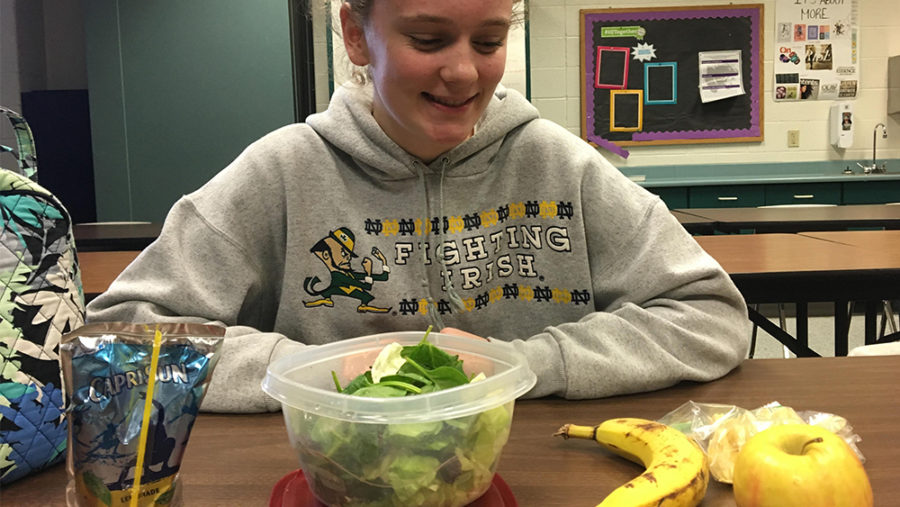What the Health: A look at Vegetarian, Pescatarian, and Vegan Lifestyles
Some students follow these diet lifestyles, but how do they affect the mind and body?
To be vegetarian it takes planning of how to get the nutrients your body needs while cutting out the main source of protein in your diet. The types of foods that vegetarians are eliminating have nutrients in them that are essential to our bodies, and without them, our bodies will be deficient in iron, which can lead to health complications.
Senior Caitlin Schlosberg has been a vegetarian for about a year now. She made the decision because at the time, her family had pet chickens. “I always felt kind of weird eating meat around them,” said Schlosberg.
Vegetarians are not allowed to eat meat and instead resort to salads, pasta, or fruits. To get the necessary nutrients their bodies need, they will often eat nuts, seeds, and vegetables for protein.
“For breakfast I normally eat some type of oatmeal, and for dinner, I eat some type of vegetable mixture with spinach, mushrooms, and sweet potatoes,” said Schlosberg. “It takes a little longer to make vegetarian food, but I think it’s worth it.”
According to Vegetarian Times, about 173 million people in the world follow a vegetarian diet with only 3.2% of those people here in the United States. Many researchers believe the numbers are so low because people are afraid of developing deficiencies and health problems.
“The main challenge I have faced is during cross country season; my iron levels were almost completely depleted, so I had to take a few weeks off to rework what I was eating,” said Schlosberg.
According to Spencer Colin’s book, Vegetarianism: A History, eating mostly meals that don’t have meat in them has positively affected people. Colin claims bodies aren’t designed to process meat in our digestive system and are instead made to process vegetables and carbs.
“Overall [becoming vegetarian] has positively impacted me because I feel better about what I’m eating,” said Schlosberg.
Similar to a vegetarian is a pescatarian. Pescatarians follow a similar lifestyle to vegetarians, but are allowed to eat seafood in their diet. Those who follow this lifestyle still cut out red meat, pork, or poultry but are able to eat a variety of different proteins namely seafood.
“I never really like eating meat,” said freshman Abby Bates, who follows a pescatarian diet. “I watched a health documentary about the meat industry and the health benefits of going meatless. After watching the documentary, I stopped eating all meat except or seafood because I love it too much.”
According to Fox News, most of the meat that is bought at grocery stores come from “Factory Farms”. A Factory Farm is a place where animals are kept and are fed foods that they would not naturally be eating. This causes different hormones in the animals that then transfer over to human bodies. These hormones are unhealthy and aren’t natural for us to be consuming.
To avoid these hormones, Bates said, she eats meat substitutes like tofu. “I’ve tried tofu and love it. I have it at least once a week,” said Bates. “I’ve been having a lot of naan bread with avocado on top for breakfast and for lunch and for dinners I almost always have lots of veggies.”
According to Judith C. Thalheimer article The Pescatarrian Diet, there are many positive effects to living a pescatarian lifestyle. Some of these benefits include lower blood pressure, a decreased risk of heart failure or diabetes, and cancer rates tend to be lower for those who follow this lifestyle.
“I feel better about what I’m eating, and I’ve been able to learn more about healthy foods a just health in general,” said Bates.
Perhaps the most strict food lifestyle is that of a vegan. Vegans eliminate all animal products and instead rely on seeds or nuts for protein. They are eliminating meat, eggs, other dairy products, and any animal-derived products.
Vegans will eat grains, beans, vegetables and fruits instead. Some vegans even go as far as to not use anything that was tested by animals.
Junior Sarah Hamilton tried following the vegan lifestyle before altering it to become a “sea-gan” – a vegan who also eats seafood.
“I usually make a stir fry. I use tofu, beans, spinach, carrots, mushrooms, onion, and some lemon, and I cook it in veggie broth since that’s healthier than oils,” said Hamilton.
According to the PETA, 11 million animals including mice, rats, frogs, dogs, cats, rabbits, hamsters, guinea pigs, monkeys, fish, and birds are killed every year in the United States due to animal testing.
“There are so many studies proving the harmful effects of animal meat and animal byproducts. I still eat seafood since it’s been my favorite food for forever, and it’s the healthiest out of all the meats,” said Hamilton.
According to British celebrity chef and restaurateur, Jamie Oliver’s website, a diet without any meat or dairy products is likely to contain a lot less saturated fat, which is related to increased cholesterol levels and increased risk of heart disease. The average vegan diet is higher in vitamin C and fiber, than one containing meat.
“People love to make fun of me and it can sometimes hurt, but I just think how I am ahead of the game. I’m making an impact and that’s what matters,” said Hamilton.


